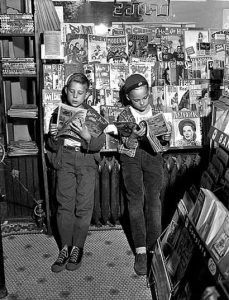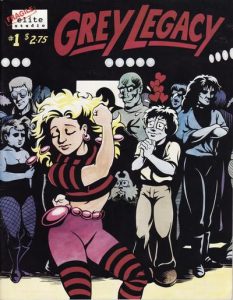From Wayne: For awhile now we’ve talked about doing an episode where we discuss the changing face of comic book retail. I have believed for some time that the retail side industry has been going through a seismic change. The last change of any real magnitude was the introduction of the Direct Market in the late 1970s. The Direct Sales market opened the doors for new creators, new publishers, more adult content, the creation of the comic book store,and a raft load of other things. Since then, with some variation, this has been the model of comics distribution and retail. But I think it has been changing, in subtle and not so subtle ways.
Back then, it was easy to point to the Direct Market and say, with some degree of confidence, that was the primary reason for the changes. Now, I believe, it is much harder to pinpoint all of the factors going into this change, or what the eventual consequences will be. Everything from an aging traditional audience, to digital sales, to the success of the trade paperback format, to Amazon… all of these play some part.
I can speak to this topic from a very personal place. For twenty-two years I worked at a very successful comic book store here in Pittsburgh. It has been in operation since 1983, was nominated for and Eisner Spirit of Retail Award, and at one time ranked among the top 5-7% of orders through Diamond in the country. Not bad for a store with a single location. Last fall I was let go due to declining sales. I’ve been doing some hours at another local chain that seems to be doing well. But, my observation is that they are doing well with other merchandise than the weekly releases or graphic novels.
Now everything is shut down due to Covid-19. Diamond isn’t shipping. Some comic book companies haves stopped production. How do you pay rent and bills if there is no income (even if you’re not meeting payroll for the short term). How do you reopen if there is no new merchandise coming in, especially when the weekly shipment of new books has been the life blood of the industry?
It brings up the question of just what role retailers play these days when there are so many other avenues to get the product. For that matter it brings up the question of what role the big publishers play, other than as an IP source for other products. Does being published by Marvel, DC, or even Image mean anything anymore? It gives your book a certain cachet, I suppose; you’ve been approved by the Gatekeepers. But that didn’t stop Raina Telgemaier from becoming a huge success. For that matter, Dave Sim and the Pini’s had fairly successful careers outside of the system forty years ago. It’s easier than ever for someone to find an audience. When I self-published Grey Legacy in 1993, my partner and I spent a lot and time and effort dealing with getting our book carried by distributors or getting individual shops to even notice. I recently made that very same issue available digitally through Amazon and it was immediately available to millions of potential customers.
Of course this extends beyond just the scope of comics retail. It’s a much bigger issue for everyone right now. What are our options as workers and consumers? Can we even imagine what this will look like three months from now?
From Mav: As Wayne said, this is a strange time for the comic book industry. I usually approach the “Ages” of comics from a POV of changes with the narrative structure and the way society was viewing them at the time, but he’s absolutely right at the ways in which they have been restructured by the retail market these last several years as well. The thing is, paper comics don’t matter… they’re stupid. There’s no good reason for them to exist. And I say that as someone who’s spent more money than I can count on literally tens of thousands of them over the last four decades. I love comics. I love the media. And I love the form factor. But I’m a dinosaur. I might as well be collecting vinyl… or honestly, 8-tracks.
And along with comic books, I love comic stores. Before Diamond pulled the plug on distribution, Image Comics publisher Eric Stephenson wrote a heartfelt open letter to comics community (mostly other publishers but the fans too) pledging that Image was going to do whatever they could to help retailers get through this, and asking for other publishers to join them. But the thing that stood out to me was Stephenson saying that he grew up in a world without comics stores and he doesn’t want to go back to that world. Me too! I WANT comic shops to exist. I really really REALLY do. Hell, Wayne and I met at the store he worked at. This show probably wouldn’t exist without them. But I REALLY REALLY REALLY want comic stores to continue. But they don’t really have to.
Because the service of the comic shop is largely social now. Yes, I go there to “buy books” but really, why I’m going there is to hang out with other fans who are also buying their books. I mean, I COULD order the books on the internet. OR I could give up on “books” altogether and just order the “content” digitally, because that’s what I really care about. The bajillion physical comics in my house mostly just take up space and I’m sure my wife would love it if I didn’t buy anymore. Think of all the trees I’d personally save. I mean, that’s silly. I don’t want that. But then… I didn’t want that with physical books either. And I sure as hell didn’t want it with music. But I have a Kindle and an iPad that I read the vast majority of my novels on. And I honestly don’t even know where one would go to buy a physical CD anymore. Seriously… I’m thinking I actually know where more niche classic vinyl stores are than an actual new CD outlet.
So do comic stores make as much sense having a Sam Goody, Camelot Music, or Jerry’s Records (or whatever your local record store is called)? Sure, I want the community as a comic fan and the experience of rifling through back issues looking to discover something. But that’s what record stores were for too. And we adapted. But we adapted in a weird way. Digital music completely changed how the music industry worked as a whole because some random guy working in his basement studio can’t totally record a 147 track LP without needing a record deal (thank you to Maximillian of ThoughtForm Music for our epic theme song, building ever so more epically). Same thing for the movie industry. Not only are Blockbusters Videos a forgotten remnant of the past, honestly so is the whole concept of a mid-range film theatrical experience. Streaming has just subsumed it.
Is this what’s destined to happen to comics? If I can stream from Comixology or the publisher directly do I *need* a physical store for books on dead tree? Do I even need the publishers if any random joe can publish his own comic to a website? Self-publishing on paper was expensive. Self-publishing on the web… not so much. I did it with my own strip, Cosmic Hellcats for like ten years. Sure, the bigger companies give you some advantages… but most of those are just glitz and glam added by money and some classic IP to tie your name to. If I’ve learned anything from COVID-19, it’s that late-night talk shows, take away the studio are basically just people doing podcasts. So I don’t know that this pandemic is going to kill “comics.” But will it let the world know that comic “books” were already dead?














Can’t wait for this one. I just had a chat with my local store owner and things are NUTS for them.
Looking forward to listening!
I started collecting floppies at an LCS several years back after being a Comixology reader for a time and fell in love with physical again. When buying digital I would have dozens of books (figuratively) pile up unread and was just buying out of habit. Physical collecting made me excited about getting my books each week, especially in the last year or two when my preferred company (Marvel) started putting out great books like Immortal Hulk, Zdarsky’s Daredevil, and the Hickman X-titles. Now I have runs like those and a number of other lengthy volumes (all of Batman Vol. 3) that are all physical and which I only want to continue buying in physical. I “own” literally thousands of issues on Comixology, including massive collections like Claremont’s X-Men, but I try to avoid double-dipping as much as possible, both for financial and aesthetic reasons.
So, long story short, even if next week Marvel, DC, and Image started releasing books in digital, unless they were a new #1, I would not buy them. In fact, I would probably drop weekly collecting for a while. And that kills me, because I have been loving more of my weekly books than any time in recent memory.
But, like most readers, I have a lot of trades I’ve bought over the years and never read and which could scratch my comics itch for a long while if need be. If my LCS goes away, I probably will for a while, too.
It’s a tough problem to frame, but I think we can’t discuss the now without at least talking about previous industry contractions, post-direct market. Especially those contractions in the late-80’s with the B&W boom-bust and then about a decade later when the speculator bubble started to burst. (Do we consider the wave of internet retail shutdowns in the early-00’s? A lot of stores, concurrently with the bursting of the speculator comics bubble also dabbled in CCGs which flooded the market at the same time that comics sales dropped hard – is there anything we can learn from this, too?) What did and/or didn’t the industry do at those times? Because, though history might not repeat, our reactions certainly have a habit of being similar.
Anyway, I think it’s important to figure out what makes this unique compared to previous hard times. Right now, maybe the internet and social media might help some stores weather the virus containment measures. These things weren’t as prevalent (even during the internet retail closures I parenthetically mentioned), so will they make an impact? It might even be negative regarding physical comics. (And I didn’t even touch on Amazon undercutting prices of trades, which we already know impacts local business.)
I hope this adds something helpful to your discussion. Thanks for reading.
Hey, Wayne, it’s Ray Tate. Glad you were doing well there for awhile. So, you know that I write comic book reviews, and I tried to make them immediate. I would get a whole bunch of reviews out by the following Wednesday. While I’m still going to be reviewing books I have in my collection and some pdfs, I don’t feel any pressure of a deadline. Because the comic book stores are closed, there’s no need. The product isn’t gong to be sold out because if you’re getting comics, it’s through pdf, or via mail. I’m actually reading, no savoring, the comic books the Phantom of the Attic delivered on their final day of operation. Batman New Adventures came out in pdf, and I’ll get that, but there’s no sense of having to get it now on a Wednesday. I have yet to buy it in fact. With comic book stores on temporary hiatus, I don’t feel the need to buy comic books the way I did. It’s a very odd feeling. To be off on Wednesday with nowhere to go, pop in online to wherever and see something I would have snapped up at the comic book store instantly and go–eh–I’ll get to that eventually. I think my biggest problem is that as a Gen-X I’ve always read my comic books in my hands. Electronic comic books are still a very new thing to me. Yes. I said Electronic.
I could write a lot, but I’ll keep it short. In regards to covid, I heard some publishers (DC?) were going to still release books digitally. If that happens and others follow suit I see that pushing a lot of dinosaurs towards digital just to keep up with plots and avoid spoilers. It’ll be a mess for shops once they open back up selling those back issues.
As for comic shops, I think they hold an important place as a place to browse/sample before you buy and also geek out with others. I’ve always felt like tabletop game stores, they’re a community place that you can just so happen purchase things at as opposed to a “store”. I think we’ve all met wonderful people and made great friendships with lasting connections because of LCBSes.
As for comics not needing to physically exist, that’s true. I think as comics push more towards a “Netflix” subscription model with a single monthly fee (and up to date books) instead of paying full issue they’ll get there. Ideally I was hoping digital comics would cost less than print comics, as outside of a sense of moral right it’s hard to spend 5 bucks on a pdf file you can find for free (pirated) with a simple Google search and no effort. I think that’s something the physical copies will have over digital as long as they treat the two as equivalents.